Notification
Please fill in the information below
Urgent
AMERICAN INTERNATIONAL HOSPITAL (AIH) SHARES CLINICAL PRACTICE EXPERIENCE IN UROLOGY AT THE VUNA–HUNA 2025 CONFERENCE
Recently, American International Hospital (AIH) participated in two specialized sessions on Urology at the VUNA–HUNA 2025 Annual Scientific Conference, co-organized by the Vietnam Urology – Nephrology Association (VUNA), the Ho Chi Minh City Urology – Nephrology Association (HUNA), and Khanh Hoa General Hospital. The event brought together over 1,500 professors, doctors, and nurses from across Vietnam, along with more than 30 international experts from Germany, France, Australia, Japan, South Korea, and other regional countries.
Over the three-day conference, 54 sessions were held featuring more than 300 high-quality scientific reports, offering valuable opportunities to update the latest medical advances in urology and nephrology. Discussions centered on modern and practical topics such as robotic surgery, minimally invasive surgery, urologic oncology, kidney transplantation, female urology, pediatric urology, and specialized nursing care.
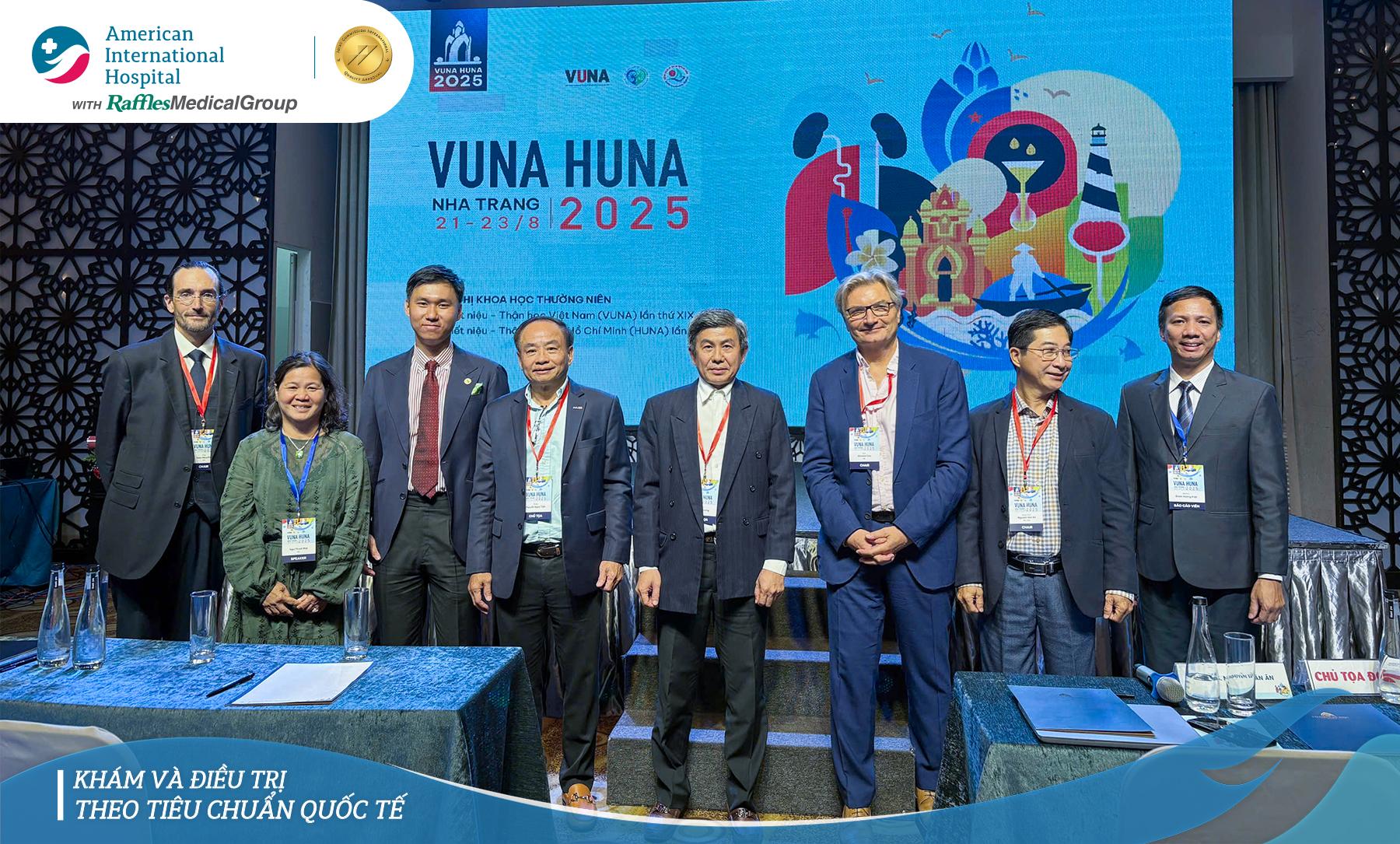
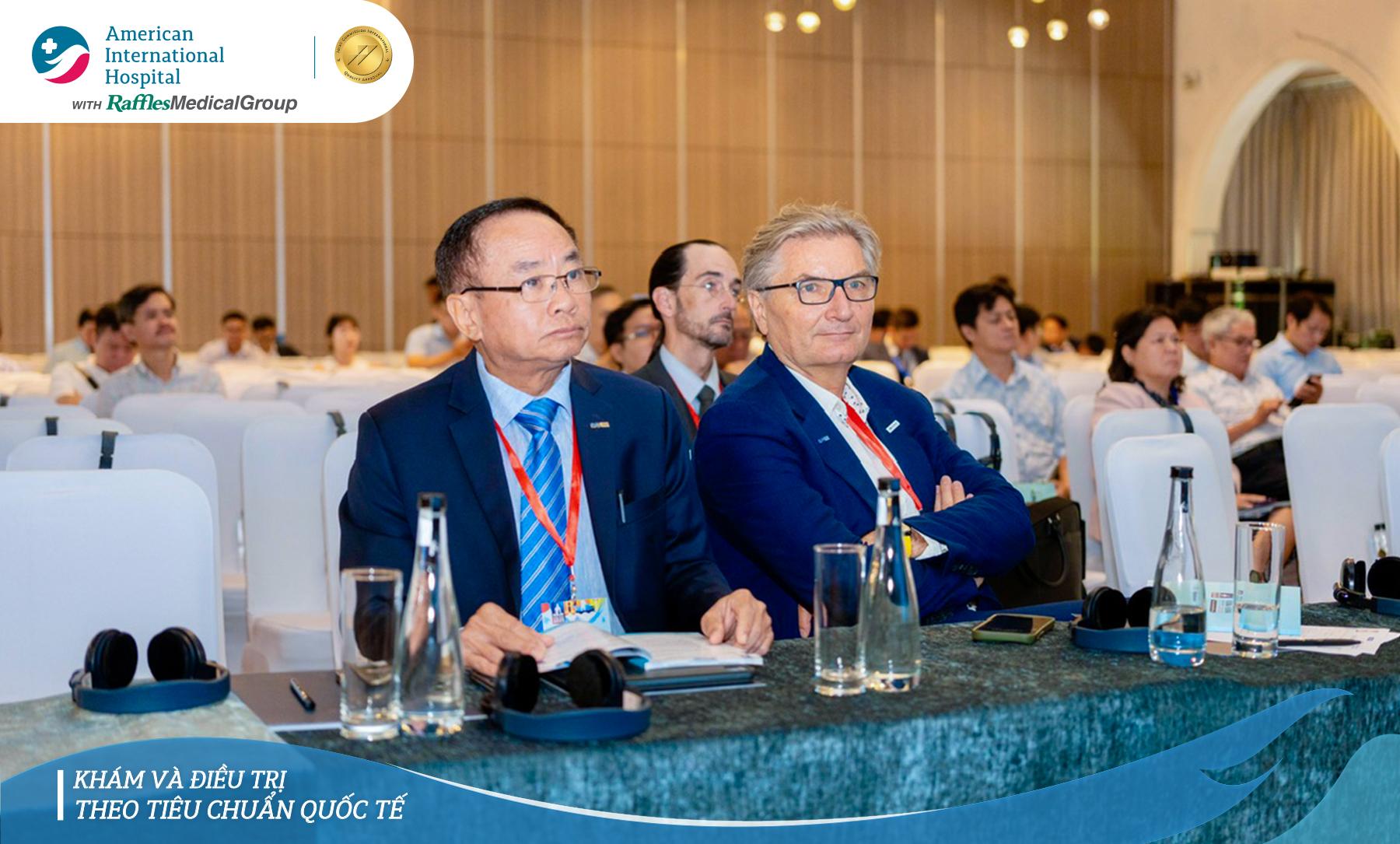
The Urology Department of American International Hospital (AIH) was honored to present new perspectives through two in-depth topics:
Successful treatment of Skene’s gland cyst – a rare tumor in the female genitourinary system.
Successful management of a rare case of recurrent bilateral staghorn cystine stones using a minimally invasive technique (Mini Percutaneous Nephrolithotomy – Mini PCNL).
The presentations were delivered by:
Dr. Nguyen Ngoc Tien, MD, PhD, Head of Nephrology – Urology – Andrology Department, American International Hospital (AIH)
Dr. Ngo Thanh Mai, MD, MSc, Specialist Level II, Urology – Andrology Department, American International Hospital (AIH)
Dr. Quach Trieu Giang, MD, Specialist Level I, General Surgery Department, American International Hospital (AIH)
Clinical case report: Successful treatment of Skene’s gland cyst at AIH
At the conference, doctors from American International Hospital (AIH) presented a rare clinical case of Skene’s gland cyst.
A 40-year-old female patient was admitted with persistent urinary tract infection, dysuria, and dyspareunia. Clinical examination and pelvic MRI revealed a 2 cm cyst adjacent to the urethral meatus, accompanied by posterior vaginal wall prolapse.
The surgical team performed marsupialization (excision of the Skene’s gland cyst edges) combined with posterior vaginal wall repair.
The surgical team performed marsupialization (excision of the Skene’s gland cyst edges) combined with posterior vaginal wall repair.
The postoperative course was favorable, and the patient was discharged after 4 days. Follow-up after 1–6 months showed complete recovery with no genitourinary symptoms.
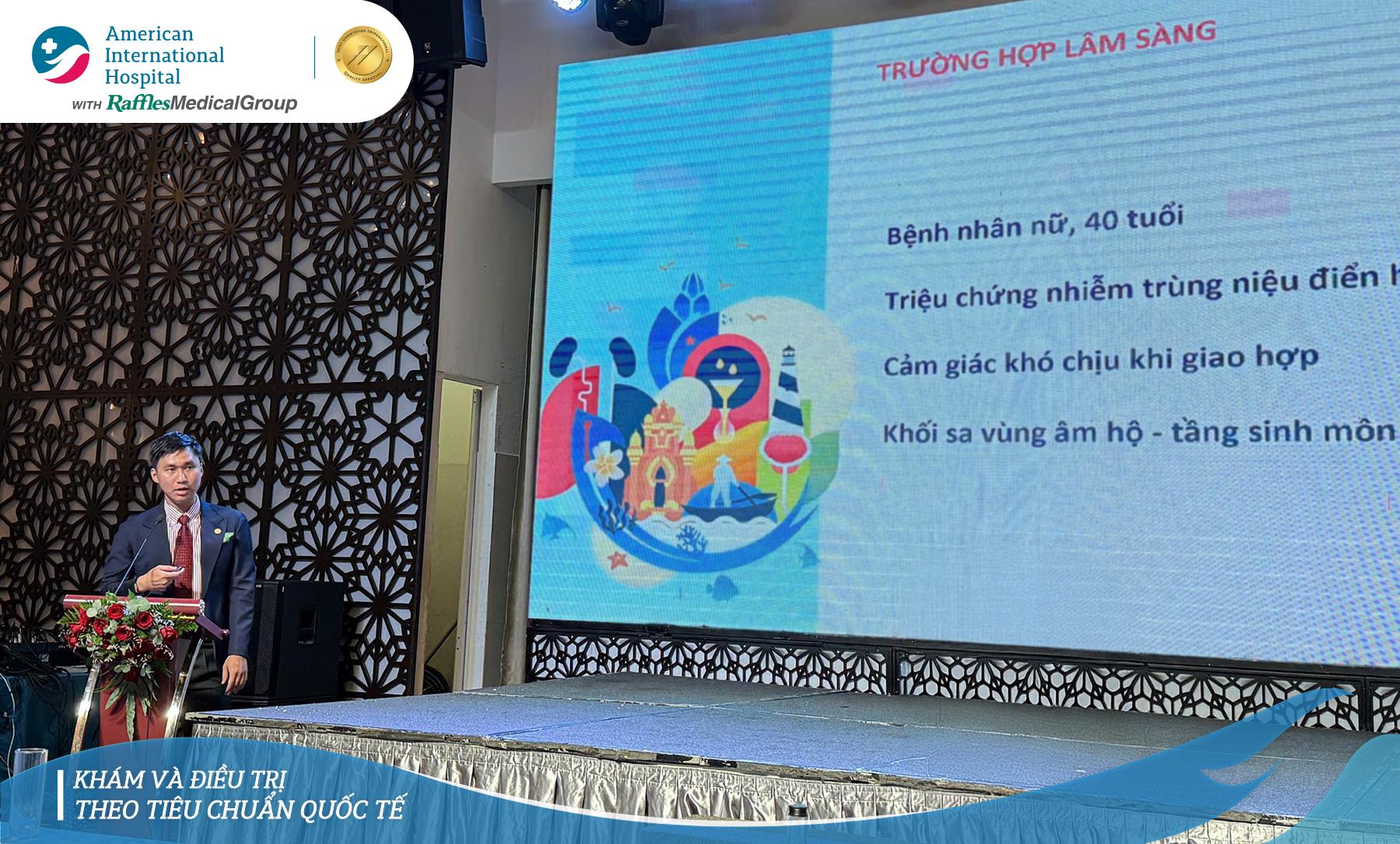
The report highlights that:
Skene’s gland cysts should be considered in the differential diagnosis when patients present with urinary disturbances and discomfort during sexual intercourse.
MRI and histopathology play a key role in confirming the diagnosis and differentiating it from other conditions.
The marsupialization technique is the treatment of choice, offering high efficacy and safety.
The case report presented at the conference contributed additional practical data on Skene’s gland cysts – a rare condition that can significantly impact women’s quality of life. The treatment case at AIH demonstrated that the combination of clinical examination, accurate imaging diagnosis, histopathological evaluation, and appropriate surgical approach is essential to achieving optimal patient outcomes.
Clinical case report: Rapidly recurrent staghorn cystine stones in both kidneys – Short-term outcomes of minimally invasive treatment
Cystine stones are a rare form of urinary stones (1–2%), associated with cystinuria caused by mutations in the SLC3A1 and SLC7A9 genes. These stones are characterized by rapid recurrence, often requiring multiple interventions and carrying a high risk of chronic kidney disease, significantly affecting the patient’s quality of life.
A 46-year-old male patient with a history of hypertension and multiple prior stone removal surgeries was admitted due to recurrent flank pain and hematuria. CT scan revealed a large stone and multiple scattered calculi in the left kidney with grade III hydronephrosis, and a large staghorn stone occupying the entire right kidney. The patient was treated in two stages using the Mini-PCNL – the first stage on the left kidney, and the second on the right. The postoperative course was uneventful, without complications, and the patient was discharged two days early after each surgery.
Stone analysis confirmed cystine composition, and genetic testing identified an SLC3A1 mutation. After surgery, renal function improved (eGFR increased from 37.6 to 51.3), and no cystine crystals were detected in the urine. The patient is currently being followed by a multidisciplinary team (Urology, Nephrology, and Nutrition) with a comprehensive long-term prevention plan to minimize the risk of recurrence in both the near and distant future.
This case demonstrates that Mini-PCNL is a feasible, minimally invasive, safe, and effective treatment for recurrent hard cystine staghorn stones. At American International Hospital (AIH), the combination of techniques with a comprehensive management strategy for patients with urinary stones not only enables disease control and renal function preservation but also focuses on optimally preventing recurrence and improving the patient’s quality of life.

The two clinical cases — a rare Skene’s gland cyst and a recurrent cystine staghorn stone — highlighted the effectiveness of minimally invasive interventions at American International Hospital (AIH). With clinical expertise, precise diagnostic coordination, application of the least invasive techniques, and a multidisciplinary, comprehensive management approach, the Urology – Andrology team at AIH demonstrates its strong professional capability to deliver safe and optimal treatment outcomes for patients.
Guided by a patient-centered philosophy, the Urology – Andrology Department at AIH not only effectively manages common urological conditions but also successfully handles rare and complex cases, affirming its position as one of the hospital’s core specialties.
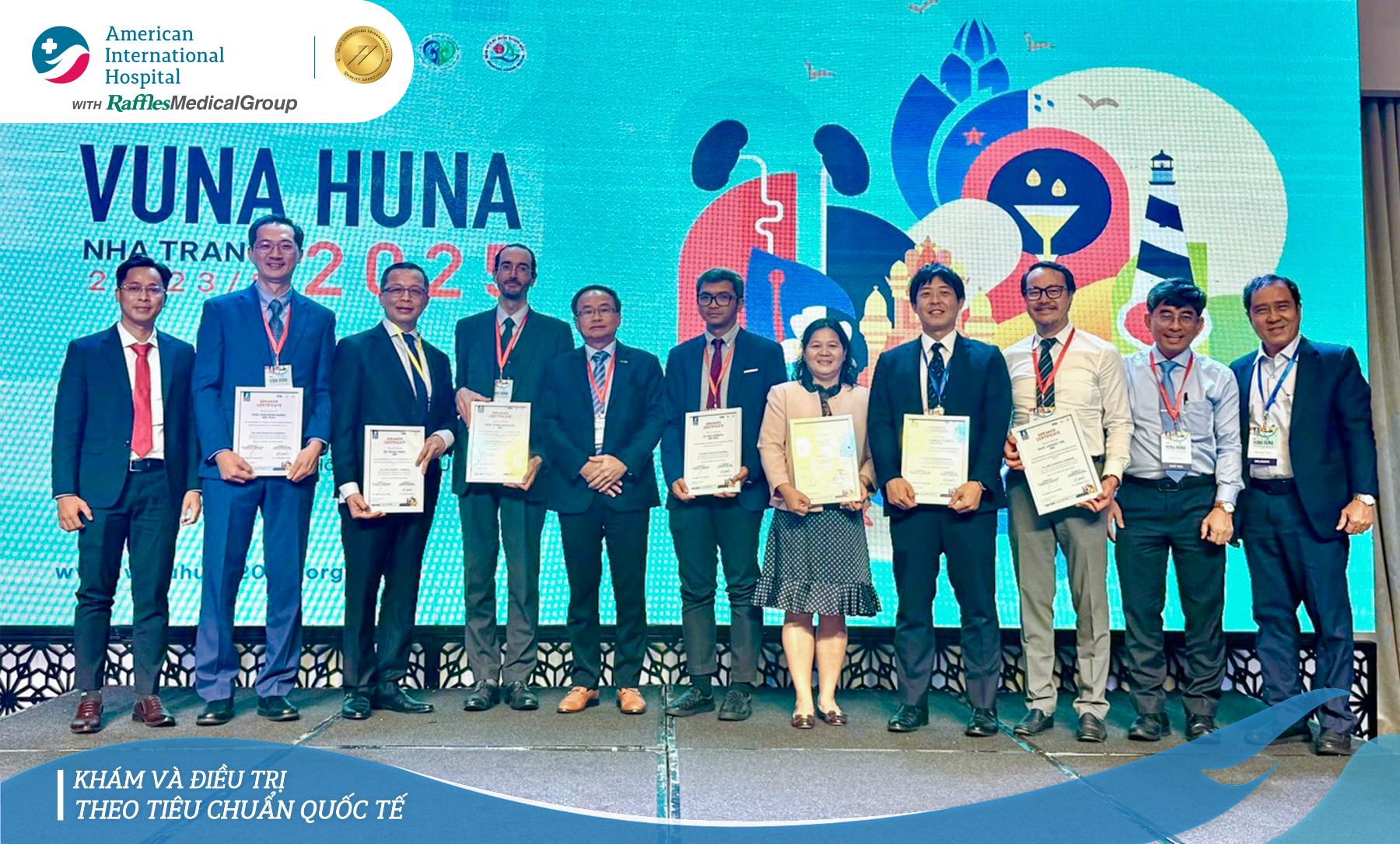


































































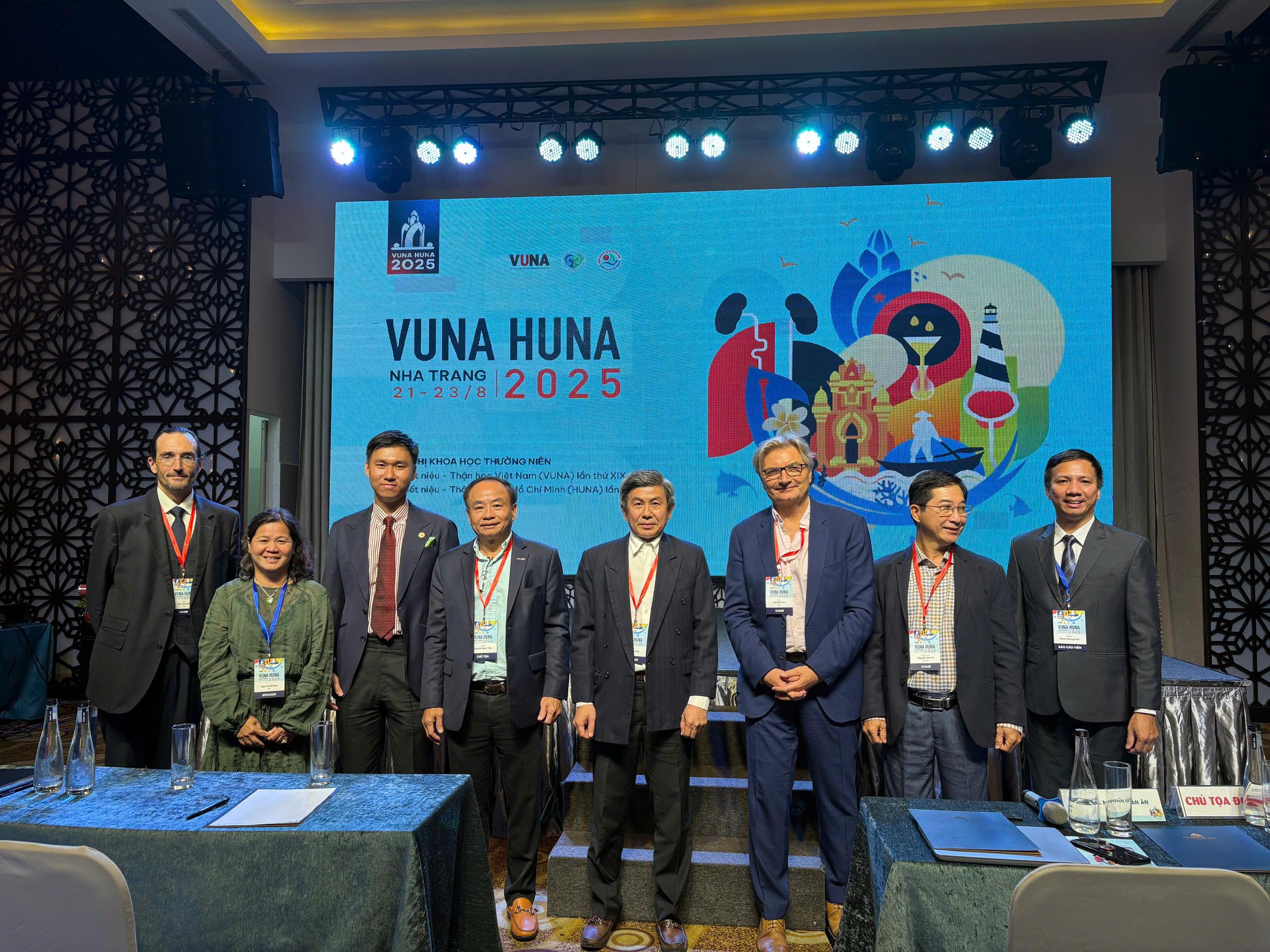



Leave a comment